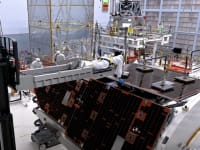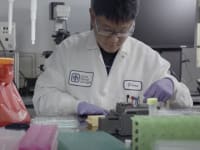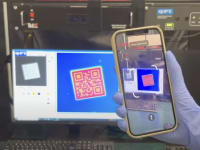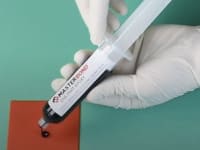61
194
-1
390
30
Question of the Week
Will Connected Eyewear Replace Traditional Glasses?
Google recently announced that it will add Google Glass options for prescription glasses. The search giant's wearable computer features an optical head-mounted display that presents information in a smartphone-like format. "We're going to reach some day, hopefully it will be soon, where people...
Question of the Week
Will "Anticipatory Shipping" Catch on?
Amazon recently obtained a patent for "anticipatory shipping" — a system of delivering products to customers before they place an order. Using predictive analytics, such as previous searches and customer wish lists, the company could potentially ship items to a hub in the customer’s area ahead of time....
Question of the Week: Manufacturing & Prototyping
Will 3D Printers Find a Place in the Home?
The 3D printing industry has new offerings today, specifically cheaper, easier-to-use hardware and online marketplaces filled with predesigned files. MakerBot, for example, recently announced a new one-button MakerBot Mini. Files can be sent directly to the compact printer from a mobile phone or tablet...
Question of the Week
Are Driverless Cars Safer?
Major car companies have showcased their latest prototypes at this month's International Consumer Electronics Show. BMW and Audi, for example, unveiled their driverless car technology and conducted demonstrations. Researchers and makers of driverless cars say the technology will be far safer than people-driven vehicles...
Question of the Week
Will 'Digital Guardians' Improve Security?
In December of 2013, IBM predicted that "in five years, each of us could be protected with our own digital guardian that will become trained to focus on the people and items it is entrusted with, offering a new level of identity theft protection." A program, for example, can learn your online habits to...
Question of the Week
Can Personalized Cognitive Technology Improve Education?
In December of 2013, IBM predicted that cloud-based cognitive technology would personalize education for students within five years. IBM is already testing out the idea in a Georgia public school district serving 170,000 students. Known as Personalized Education Through Analytics on Learning...
Question of the Week
Will Amazon's Drone Delivery Service Really Fly?
Amazon CEO Jeff Bezos recently announced that Amazon's R&D department is working on "Amazon Prime Air," a service that enables drones to deliver packages within 30 minutes. The earliest the technology could be in service, however, is 2015, because the FAA will need to update its laws.
Question of the Week
Can a Computer Be Taught Common Sense?
Researchers are building a massive computer system that browses millions of pictures and decides for itself what they all mean. The system at Carnegie Mellon University, called NEIL (short for Never Ending Image Learning) has been searching the Internet for images 24/7 and, in tiny steps, is determining how...
Question of the Week
Will Asteroid Mining Missions Pay Off?
Two firms are already planning prospecting missions to passing asteroids. Meteorites contain precious metals, including platinum and rhodium, but the presence of hydrogen and oxygen could also enable 'pit stops' to create fuel for Mars missions.
Question of the Week
Would You Use an All-In-One 'Coin?'
A San Francisco startup introduced an all-in-one card, called Coin, meant to store financial information from every other card carried in a wallet. The device, available for preorder, includes a magnetic strip that can change depending on what card one wants to use. What do you think? Would you use an all-in-one...
Question of the Week
Will You Talk and Text in the Air?
An in-flight service from Gogo allows travelers to text and talk as if they are on the ground. By using the company's air-to-ground connectivity, calls and texts are routed through the aircraft's wireless network rather than in-flight cell towers, or "picocells."
Question of the Week
Will the Starchase System Make Pursuits Safer?
A StarChase system being used by police in Florida and Iowa allows police officers to fire "a miniature GPS module encased in a tracking projectile/tag" from a "launcher" mounted on a police cruiser's grill. The GPS module then sticks to the rear of the fleeing car, allowing dispatch to track the...
Question of the Week
If You Had the Opportunity, Would You Take a Ride to near Space?
World View Enterprises will offer $75,000 helium balloon rides into “near space," allowing people to ride higher than 98,000 feet above Earth’s atmosphere.
Question of the Week
Would You Use Headphones That Play Music Based on Your Mood?
Microsoft is researching earbuds that play music based on your mood. The "Septimu" headphones contain internal measurement units (IMUs), a thermometer, and a heart rate monitor. The headphones will also detect posture, keep a health diary, and monitor exercise patterns. A University...
Question of the Week
Do the Benefits of Car Connectivity Outweigh the Drawbacks?
Car-to car and car-to-infrastructure communication, which uses Wi-Fi and cellular technologies to inform drivers of any obstacles in the road, is advancing. Technologies like V2X can be used to deliver warnings to other drivers if, for example, a car has crashed or broken down in the road....
Question of the Week
Should Electronic Devices Be Used During Takeoffs and Landings?
A government advisory panel urged the Federal Aviation Administration to ease the long-standing ban on using the devices during takeoffs and landings. Since the curbs were put in place, airliners have been made more resistant to electronic interference, and many have their own...
Question of the Week
Will 3D Printing Be a Feasible Way to Build Beyond Earth?
In an attempt to build dwellings on Mars, Russian architects, ZA, have proposed a series of robots that would identify weak areas in the Martian soil, carve them out, and then, using a process similar to that of structural 3D printing, create interior structures using the leftover soil on...
Question of the Week
Will 'Bodies on a Chip' Improve Drug Testing in the near Future?
A new bioprinting project, backed by $24 million from the U.S. Department of Defense, will attempt to 3D-print miniature human organs. The 2-inch "body on a chip" will test how the human body reacts to diseases, chemical warfare agents, and new drugs intended to defend against...
Question of the Week
Will Biometrics Become a Must-have for Consumers?
Apple Inc. added a fingerprint scanner to its latest version of the iPhone, offering biometric security possibilities for workplaces or mobile commerce. Some analysts say that Apple's embrace of fingerprint scanning could lead to wider adoption and mainstream usage. Many laptops, external...
Question of the Week
Will Wearable Computing Become Mainstream?
Bluetooth HD earmuffs, made by activewear company 180s, will debut this fall. The Bluetooth product, which warms your ears while also hiding speakers and a microphone, is another example of wearable computing — a technology area that includes trendy devices like smartwatches and Google Glass. Many...
Question of the Week
Are 'Virtual Receptionists' a Good Idea?
The London borough of Brent is using a virtual receptionist, or hologram, to greet visitors in its new civic center. The hologram responds to questions about locations in the building, such as where to register births or where to head to apply for a marriage certificate. The virtual employee will be...
Question of the Week
Is a Hyperloop on the Way?
Last week, entrepreneur Elon Musk unveiled a transportation concept that he said could whisk passengers the nearly 400 miles between Los Angeles and San Francisco in 30 minutes. The theoretical Hyperloop would consist of carlike capsules traveling at more than 700 mph through enclosed tubes. The capsules, which would...
Question of the Week
Would You Trust a Robot to Draw Your Blood?
As medical technology advances, doctors are increasingly being assisted by robots. Tele-operated machinery like the Da Vinci system, for example, helps surgeons perform a variety of surgeries. One of the latest technologies, Veebot, is a robot phlebotomist that uses infrared light, a camera, and...
Question of the Week
Is an "Exercise Pill" a Good Idea?
This month, researchers at the Scripps Institute in Florida found that mice injected with a protein called REV-ERB underwent physiological changes usually associated with exercise, including increased metabolic rates and weight loss. The scientists suggested that we are therefore closer than ever before to...
Question of the Week
Will We Travel Faster Than the Speed of Light?
NASA engineers at Johnson Space Center have been designing instruments to slightly warp the trajectory of a photon, changing the distance it travels in a certain area, and then observing the change with an interferometer. The team is experimenting with photons to see if warp drive — traveling...
Question of the Week
Will You Ever Make Payments Using Facial Recognition Technology?
Technologies like Google Wallet allow users to walk into a store and pay for goods with the swipe of a smartphone. Now, some companies, including the Finland-based startup Unqul, are creating payment systems that use facial recognition to handle all kinds of transactions. Instead of...
Question of the Week: Robotics, Automation & Control
Do You Believe Humanoid Robots Can Effectively Aid Humans with Difficult and Dangerous Tasks?
A Pentagon-financed humanoid robot named Atlas made its debut last week. The hydraulically-powered robot, with its oversized chest and powerful long arms, is seen as a new tool that can help humans in natural and man-made disasters. Similarly, an...
Question of the Week
Is Twitter More Valuable Than Newswires?
A University of Edinburgh study, supported by the Engineering and Physical Sciences Research Council, found that news agencies continue to have an edge over Twitter in breaking news first. Over an 11-week period, researchers compared millions of tweets to the output from major news websites. The study...
Question of the Week
Do lightning surge problems cause equipment reliability issues in mission critical applications such as data centers, hospitals, banks, and telecommunications infrastructure?
In 2013, Littelfuse is taking engineers behind the scenes at
NASA for a truly unique Exploration & Discovery experience. Speed2Design
TechTalk events will be hosted at...
Top Stories
Blog: Manufacturing & Prototyping
2025 Holiday Gift Guide for Engineers: Tech, Tools, and Gadgets
INSIDER: Research Lab
Scientists Create Superconducting Semiconductor Material
Blog: Software
Quiz: Materials
Blog: Aerospace
Tech Briefs Wrapped 2025: Top 10 Technology Stories
Blog: Manufacturing & Prototyping
Webcasts
 Upcoming Webinars: AR/AI
Upcoming Webinars: AR/AI
The Real Impact of AR and AI in the Industrial Equipment Industry
 Upcoming Webinars: Motion Control
Upcoming Webinars: Motion Control
Next-Generation Linear and Rotary Stages: When Ultra Precision...
 Upcoming Webinars: Energy
Upcoming Webinars: Energy
Hydrogen Engines Are Heating Up for Heavy Duty
 Podcasts: Medical
Podcasts: Medical
How Wearables Are Enhancing Smart Drug Delivery
 Podcasts: Power
Podcasts: Power
SAE Automotive Podcast: Solid-State Batteries


























